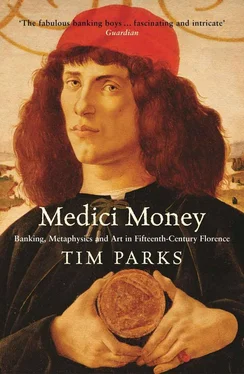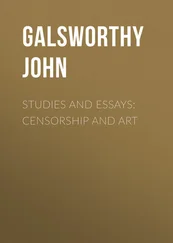It is King Agamemnon who rules the mad round of exchanges that begins the Iliad , and it is the king whose head, in centuries to come, would always appear on coinage. Divinely appointed, the monarch sanctions and governs the practice of exchange, which is to say the economic relationships among the subjects he rules. The process was much speeded up now, of course, for money enables us to sell to one person, store our wealth, then buy from another. We don’t have to cast about for that unlikely individual who has exactly what we want and wants exactly what we have. All the same, as long as money is made up of a precious metal that has value in itself as a commodity, then nothing fundamental has changed. We sweat to produce, as God told us we must when He threw us out of paradise; we sell our wares for a certain weight of gold or silver or copper, then use that, or part of it, to buy what someone else has sweated to produce. True, some perverse parallels arise: We can now compare the unit cost of a whore with that of a flask of wine, or a copied manuscript, or a prayer for the dead. But everything is still more or less in order and everyone in his place.
Usury alters things. With interest rates, money is no longer a simple and stable metal commodity that just happens to have been chosen as a means of exchange. Projected through time, it multiplies, and this without any toil on the part of the usurer. Everything becomes more fluid. A man can borrow money, buy a loom, sell his wool at a high price, change his station in life. Another man can borrow money, buy the first man’s wool, ship it abroad, and sell it at an even higher price. He moves up the social scale. Or if he is unlucky, or foolish, he is ruined. Meanwhile, the usurer, the banker, grows richer and richer. We can’t even know how rich, because money can be moved and hidden, and gains on financial transactions are hard to trace. It’s pointless to count his sheep and cattle or to measure how much land he owns. Who will make him pay his tithe? Who will make him pay his taxes? Who will persuade him to pay some attention to his soul when life has become so interesting? Things are getting out of hand.
Contro natura! thunders the Church — against nature. Usury is unnatural and God punishes it with the plague, warns the preacher Bernardino of Feltre. To defend themselves from the plague, the merchants of Florence pay for an expensive bronze door showing one of the strangest exchanges ever made, or at least proposed: Abraham’s sacrifice of Isaac. Ghiberti’s doors were so beautiful they were “fit to be the gates of paradise,” said Michelangelo. And he was gay. Contro natura , thunders the Church. In Dante’s hell, sodomites and usurers are punished in the same place, the third ditch of the seventh circle where flakes of burning ash sift for all eternity on an unnatural landscape of scorching sand. The sodomites are forced to exist (how can we say live?) in an unnatural perpetual motion. The usurers are forced to sit unnaturally still, as they did at their accounts. Only their hands move rapidly and unnaturally, as once they moved counting coins or writing bills that have no currency beyond the grave. Their faces are disfigured. Grief bursts from the eyes they ruined over their registers. Unaided by Giotto’s frescoes, Reginaldo degli Scrovegni is down there: “He twisted his mouth and stuck out his tongue like an ox that licks its nose.” Contro natura!
The other inmates of that infernal ditch are the blasphemers. It is unnatural to curse your creator. None of these three sins is considered such today. If a man, today, negotiates a mortgage with a client in the afternoon, has sex with his male lover in the evening, and blurts out, “Christ Almighty,” when the alarm starts him from sleep in the morning, we have no difficulty thinking of him as a decent bloke. Or not in the West. In an Islamic state, all three actions are punishable. For the Koran will no more permit the lending of money at an interest than it will allow Salman Rushdie to deride the name of Muhammad, or two consenting males to make love. Usury makes money “copulate,” said the theologians, quoting Aristotle. Which is unnatural.
If you still find this hard to grasp, you’re in good company. “Go back a little way,” Dante’s pilgrim poet begs his guide Virgil as they hurry through hell, “to where you told me that usury offends God’s goodness, and untie that knot for me.” He can’t quite see it. Summarizing Thomas Aquinas, Virgil explains that “nature takes its course from heavenly intellect,” and that “human toil, as far as it is able, follows nature, as the pupil does his master, so that it is God’s grandchild, as it were.” In short, God creates work to complete man’s nature. Refusing work, the usurer rejects nature, rejects the way God has chosen for him, insults God’s grandchild.
Crucially, then, we must imagine a mind that believes that moral codes are based not on the well-being or otherwise of our fellow man — the poor are not mentioned here — but on metaphysics. The distance between believing that lending at an interest is always a sin, because unnatural , to the modern notion that interest rates are quite normal, but iniquitous when so high that they push a Third World country into poverty, might be one way of measuring the distance between fourteenth-century man and ourselves. That said, however, and granted the good faith of Aquinas and Dante, the sheer violence of the Church’s hostility to usury makes it hard to believe that priests and pope didn’t have some urgent, worldly interest in the matter. One’s “toil,” after all, in the medieval world, meant one’s station in life — miller, knight, butcher, peasant — which was largely fixed from birth. To refuse one’s station was to refuse the fixed order of society in which the Church had a considerable investment, and to throw the world into turmoil.
TURMOIL. “IN OUR change-loving Italy,” wrote Enea Silvio Piccolomini, later Pope Pius II, “where nothing stands firm, and where no ancient dynasty exists, a servant can easily become a king.” Politically, at the time of Giovanni di Bicci’s birth in 1360, the peninsula was on the edge of chaos and had been for some long time. Basically, the twenty or more tiny states of central and northern Italy were kept in a constant ferment of revolution and usurpation by the two opposing and interminably disruptive poles of the Papal States to the south and the Holy Roman Empire to the north, each claiming to be the rightful inheritor of the Roman Empire but neither able to impose its claim. Cities declared independence. Mercenary adventurers carved out little kingdoms for themselves, then went to pope or emperor, or pope and emperor, to buy a piece of parchment conferring legitimacy: “As legal over-lords of Rimini, or Cremona, or Bologna, we grant you the right to rule there.” This in return, of course, for a sum of money, or a share of the taxes. Nobody was impressed. Least of all the next adventurer.
In the country, the nobles’ feudal rights depended on recognition of the Holy Roman Emperor as ultimate feudal overlord, so they supported him (the Ghibellines); in the cities, the middle classes, who sought to free themselves from the nobles, tended to side with the pope (the Guelfs). Often it was hard to tell who controlled or legitimately taxed a given territory. Factions abounded. In the cities, the more powerful families built towers to defend themselves against each other. In 1200, Florence had about a hundred such constructions, many more than one hundred and fifty feet high. Even today, Florence doesn’t seem large enough for a hundred towers. People threaded the narrow streets between armed camps. Crossing the river Arno at different points meant passing from one family’s territory to another. Weapons abounded. The murder rate was frightening. Meanwhile, amid the confusion and in the absence of any recognized authority, two factors came powerfully to the fore: individual charisma and money. “No trace is here visible,” writes the great historian Jakob Burckhardt, “of that half religious loyalty by which the legitimate princes of the West were supported; personal popularity is the nearest approach we can find to it. Talent and calculation were the only means of advancement.”
Читать дальше












